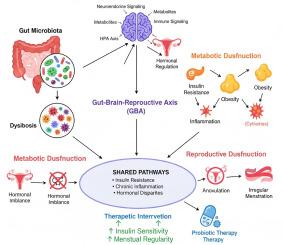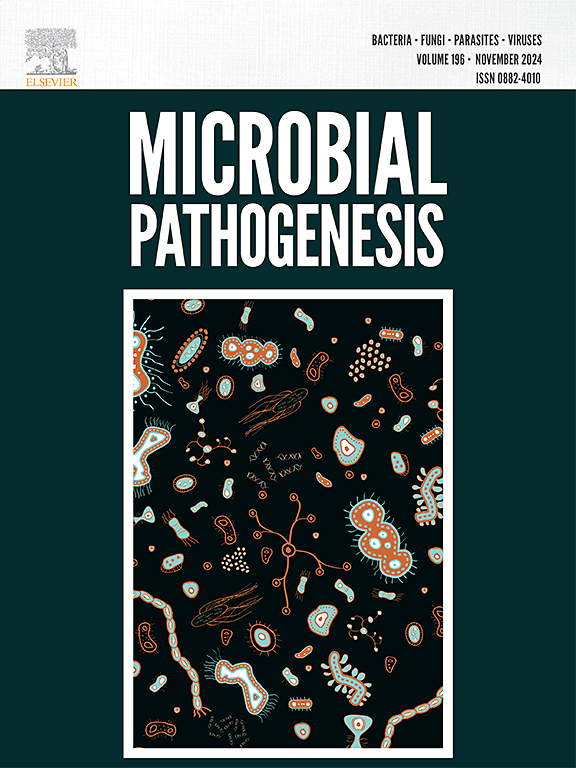Modulating metabolism and reproductive health through microbiome driven gut-brain axis therapies
IF 3.5
3区 医学
Q3 IMMUNOLOGY
引用次数: 0
Abstract
The gut microbiome plays a crucial role in regulating metabolic and reproductive health through the gut-brain axis. This review underscores the therapeutic potential of modulating gut microbiota to alleviate conditions such as obesity and polycystic ovarian syndrome (PCOS). Gut dysbiosis as an imbalance microbiome, has direct effect on insulin resistance, hormonal imbalances, and systemic inflammation. It contributes to metabolic and reproductive disparities. This study reveals the coordination between dysbiosis and obesity, and PCOS. Alterations in gut-microbiota is the major contributor of insulin-resistance, menstrual dysfunction, and hormonal imbalances. It also focuses on the efficacy of probiotic and relevant microbes. Considering the literature, microbiome-potential and its role in treating the interventions is significantly important. Outcomes recommend that gut-dysbiosis aggravates metabolic and reproductive health illnesses by making worse hormonal inequalities and inflammation. The therapy probiotic has indicated favorable outcomes in enhancing insulin-resistance and menstrual cycle regulation, highlighting its capability as a reliable treatment for PCOS and obesity. Nevertheless, well-monitored clinical trials are necessary on large scale to make it optimized microbiome-focused treatments for long-term results and safety.

通过微生物组驱动的肠-脑轴疗法调节代谢和生殖健康。
肠道微生物组通过肠脑轴在调节代谢和生殖健康方面起着至关重要的作用。这篇综述强调了调节肠道微生物群缓解肥胖和多囊卵巢综合征(PCOS)等疾病的治疗潜力。肠道生态失调作为一种微生物群失衡,对胰岛素抵抗、激素失衡和全身性炎症有直接影响。它会导致代谢和生殖方面的差异。本研究揭示了生态失调与肥胖和多囊卵巢综合征之间的协调关系。肠道微生物群的改变是胰岛素抵抗、月经功能障碍和激素失衡的主要原因。它还侧重于益生菌和相关微生物的功效。考虑到文献,微生物群潜力及其在治疗干预中的作用非常重要。结果表明,肠道生态失调通过使激素不平等和炎症恶化,加重了代谢和生殖健康疾病。益生菌治疗在增强胰岛素抵抗和调节月经周期方面显示出良好的效果,突出了其作为多囊卵巢综合征和肥胖症可靠治疗的能力。然而,有必要进行大规模的良好监测的临床试验,以优化以微生物组为重点的长期疗效和安全性治疗。
本文章由计算机程序翻译,如有差异,请以英文原文为准。
求助全文
约1分钟内获得全文
求助全文
来源期刊

Microbial pathogenesis
医学-免疫学
CiteScore
7.40
自引率
2.60%
发文量
472
审稿时长
56 days
期刊介绍:
Microbial Pathogenesis publishes original contributions and reviews about the molecular and cellular mechanisms of infectious diseases. It covers microbiology, host-pathogen interaction and immunology related to infectious agents, including bacteria, fungi, viruses and protozoa. It also accepts papers in the field of clinical microbiology, with the exception of case reports.
Research Areas Include:
-Pathogenesis
-Virulence factors
-Host susceptibility or resistance
-Immune mechanisms
-Identification, cloning and sequencing of relevant genes
-Genetic studies
-Viruses, prokaryotic organisms and protozoa
-Microbiota
-Systems biology related to infectious diseases
-Targets for vaccine design (pre-clinical studies)
 求助内容:
求助内容: 应助结果提醒方式:
应助结果提醒方式:


